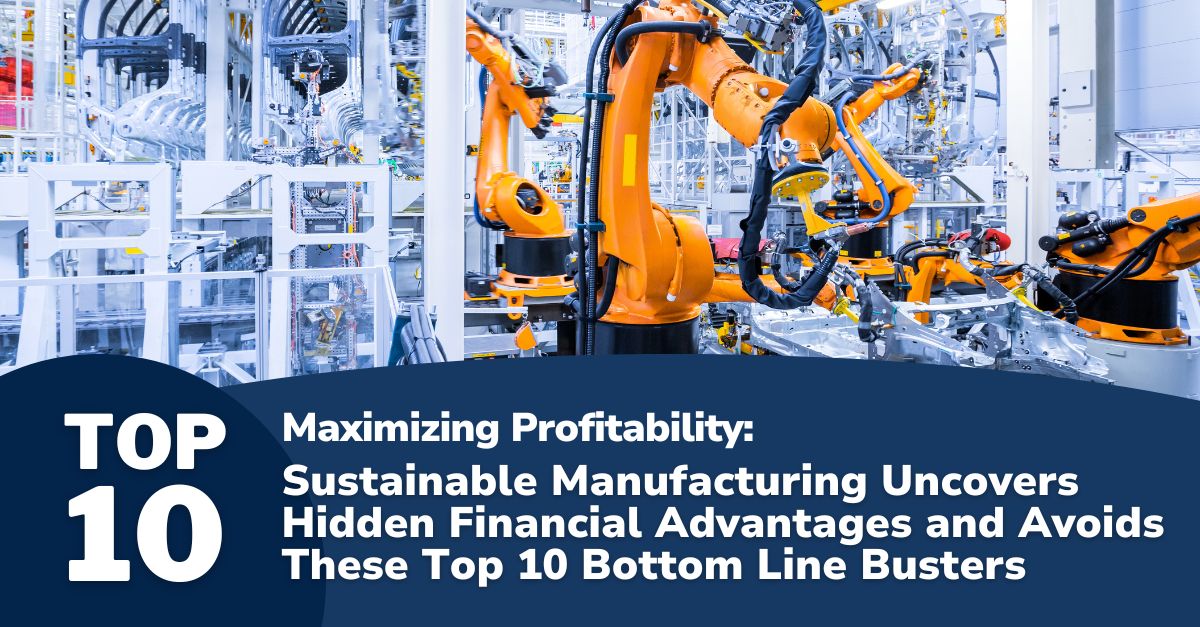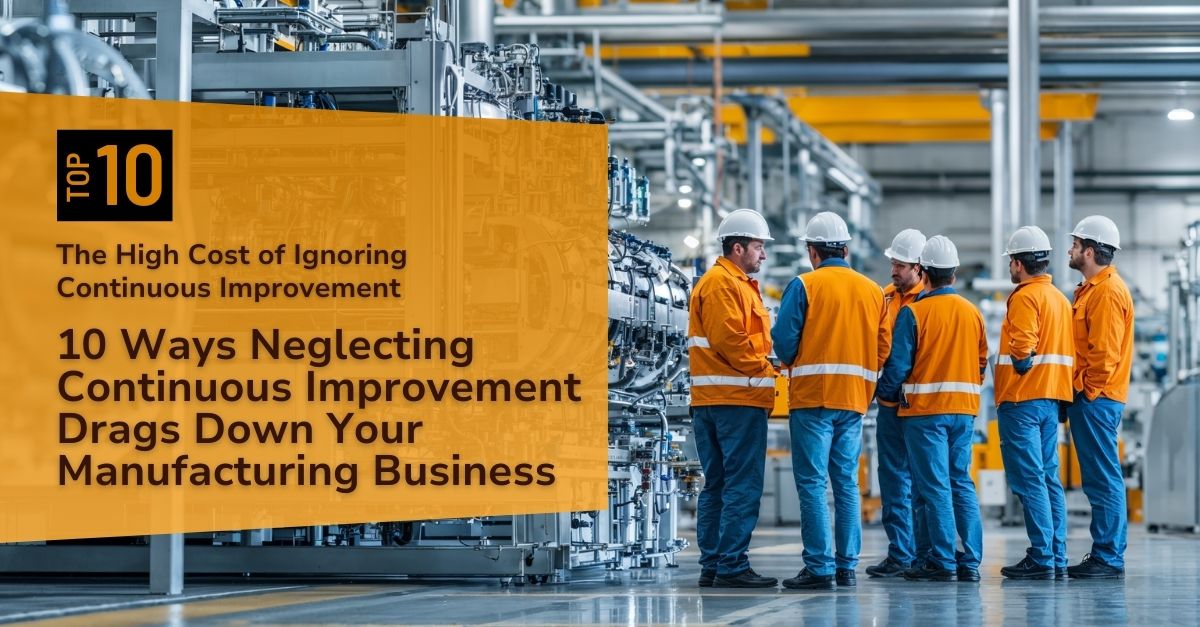
The intersection of long-term financial viability and efficient operational practices has brought the concept of sustainable manufacturing into sharp focus for businesses on a global scale.
This sensible approach to resource management goes beyond traditional conservation and environmentally conscious practices that are often for show and instead embeds efficiency and innovation at the heart of operations, securing a competitive edge and ensuring long-term financial viability in a rapidly changing market.
As industries worldwide grapple with the challenges of market volatility, instability, and competitive pressures, the transition toward sustainable manufacturing emerges as a critical lever for enhancing operational efficiency, reducing costs, and maintaining market relevance.
Despite the clear economic incentives, numerous manufacturers encounter obstacles in embracing these resource-conscious practices fully, which can have significant implications for their financial performance and competitive standing.
Based on our experience, this detailed exploration dissects the top 10 financial challenges and risks manufacturers face when not leveraging efficient operational practices and the tangible business benefits of adopting a sustainable manufacturing business model.
1Increased Operational Costs:
Overlooking sustainable practices can substantially increase operational expenses, including higher utility costs and escalated spending on raw materials due to inefficient use and reliance on traditional, cost-intensive resources. Implementing energy-efficient processes and optimizing resource use can result in substantial cost savings.
2Added Waste Management Expenses:
The accumulation of waste significantly raises disposal and management costs. By integrating lean manufacturing and waste minimization techniques, businesses can notably decrease these expenses.
Lean manufacturing optimizes efficiency by eliminating non-essential activities, while waste minimization practices, like recycling and optimizing production resources and processes, reduce waste generation.
These strategies offer substantial cost savings, bolster financial stability, and provide a sensible approach to resource conservation, leading to a leaner, more sustainable operation.
3Resource Utilization Inefficiencies:
Traditional manufacturing processes often lead to suboptimal use of materials and energy, driving up costs unnecessarily. Streamlining these processes through sustainable practices can enhance material efficiency and energy use, reducing costs and improving margins.
A significant number of US-based manufacturers are realizing substantial financial benefits from sustainable resource management. These practices not only support environmental goals but also enhance operational efficiency, leading to reduced costs and waste, thereby bolstering the companies’ growth and global competitiveness
4Elevated Energy Costs:
Industries not prioritizing energy efficiency do indeed face rising energy expenditures. Integrating energy-saving technologies and practices allows businesses to significantly reduce energy costs, thereby enhancing their overall financial performance.
The International Energy Agency (IEA) emphasizes that cost-effective energy efficiency improvements can lead to positive macroeconomic impacts, boosting economic activity and often resulting in increased employment. This demonstrates how energy efficiency not only aids in managing expenses but also contributes to broader economic benefits.
5Increased or Unexpected Regulatory Compliance Costs:
Adhering to increasing regulatory requirements related to energy and resource use can impose additional costs on businesses unprepared for sustainable operations. Proactive compliance through sustainable practices can mitigate these costs and avoid potential financial penalties and reduce business risk.
6Reduced Market Competitiveness:
In an economy where operational efficiency and cost management are key differentiators, businesses ignoring sustainable practices risk losing their competitive edge.
Sustainability-oriented companies often achieve lower operating costs and greater market appeal, which places them more favorably within the competitive landscape. Research shows that companies focusing on sustainability can unlock environmental and financial benefits by optimizing their operations.
Such optimizations lead to reduced costs through efficient manufacturing processes and supply chains and enhance the company’s appeal in the market by aligning with growing consumer and stakeholder expectations for environmental responsibility.
7Customer Preference Shifts:
As market dynamics evolve, customer preferences increasingly lean towards companies that offer cost-efficient and innovative solutions. Sustainable manufacturing practices can meet these expectations by driving down costs and enhancing product value, thereby retaining customer loyalty and expanding market share.
8Lower Talent Attraction and Retention:
Attracting and retaining skilled employees is crucial for maintaining a competitive edge. Manufacturers not focusing on sustainability are disadvantaged when hiring and keeping the right people for the job.
Genuinely sustainable companies are more appealing to the workforce, especially to those in the early stages of their careers who seek a sense of purpose and alignment with their values. This trend underscores the growing expectation for companies to commit to sustainability, positively impacting talent attraction and retention.
Further supporting this data, a recent study by the IBM Institute for Business Value found that over 70% of workers are attracted to environmentally sustainable employers, with a significant portion willing to accept lower salaries for roles at such organizations. This finding underscores the importance of a company’s sustainability record in its talent search and employee retention strategies.
9Supply Chain Vulnerabilities:
Manufacturers that overlook the efficiency and resilience of their supply chain may incur higher costs and face operational disruptions. Sustainable practices can enhance supply chain resilience, ensuring uninterrupted operations and cost-effectiveness.
10Missed Innovation and Improvement Opportunities:
Manufacturers that fall behind in innovation and improvement incur higher production costs due to outdated processes, face reduced competitiveness as they cannot offer the latest or most efficient products, and suffer from operational inefficiencies.
This stagnation not only hampers their ability to reduce expenses and enhance operations but also diminishes their competitiveness and standing as industry leaders.
The pursuit of sustainability fosters a culture of innovation, enabling businesses to discover cost-saving measures and operational improvements. This approach not only reduces expenses but also positions companies as market leaders in efficiency and innovation, bolstering competitive advantage.
Conclusions for Manufacturing Operations Leaders
A strategic focus on economic sustainability and operational efficiency drives the journey towards sustainable manufacturing. This approach is not merely about adapting to changing market conditions but about actively seizing opportunities to enhance financial performance and secure a competitive position. By addressing the challenges outlined, manufacturers can tap into significant cost savings, operational improvements, and market advantages.
The imperative for businesses today is clear: integrating sustainable manufacturing practices is essential for economic sustainability and long-term success.
By focusing on the financial benefits and cost savings associated with sustainable practices, manufacturers can navigate the complexities of modern markets with greater agility and resilience, ensuring their growth and profitability for the future.
Elevating Performance with POWERS:
Driving Efficiency and Cost Effectiveness
At POWERS, we focus on enhancing your manufacturing operations through a comprehensive approach that prioritizes efficiency and cost reduction. Our process goes beyond traditional management systems, targeting the heart of operational excellence to ensure financial sustainability and competitive strength in the market.
By partnering with POWERS, you’ll experience a transformative shift in managing your operations, emphasizing maximizing efficiency and minimizing costs. Our approach is about integrating your team’s efforts with your strategic objectives, creating a harmonious operation where every aspect of your business contributes to overall success.
We’re not just about implementing a system; we’re about revolutionizing your operational framework to achieve unprecedented performance and cost savings.
This vision of operational excellence is what sets businesses apart, enabling them not only to lead but to outshine competitors consistently.
For manufacturers aiming to redefine their position in the industry, our methodology offers more than just improvements—it provides a pathway to a complete overhaul of operational practices. The POWERS team is ready to guide you through this journey, providing the expertise and support needed to excel in today’s demanding manufacturing environment.
Unlock the door to enhanced operational efficiency and cost-effectiveness with POWERS. Start your transformation toward operational excellence now. For a detailed discussion of how we can assist your business, contact our professionals at +1 678-971-4711 or email info@thepowerscompany.com.
Continue Reading from this Mastery Series
- Part 1 - How Runaway Costs Derail Manufacturers’ Drive for Sustainability
- Part 2 - Tackling Excessive Waste Management Issues in Manufacturing
- Part 3 - Mastering Resource Efficiency in the Quest for Manufacturing Excellence
- Part 4 - The Impact of Unmitigated High Energy Costs on Manufacturers
- Part 5 - How the Complexities of Regulatory Compliance Can Erode Margins
- Part 6 - Navigating the Challenges of Reduced Market Competitiveness for Sustained Profitability
- Part 7 - Don’t Let Preferences Pull You Under
- Part 8 - Low Talent Investment is Undermining Your Bottom Line
- Part 9 - Don’t Let Supply Chain Vulnerabilities Bleed Your Profits
- Part 10 - Outsmart the Competition and Protect Your Profits







